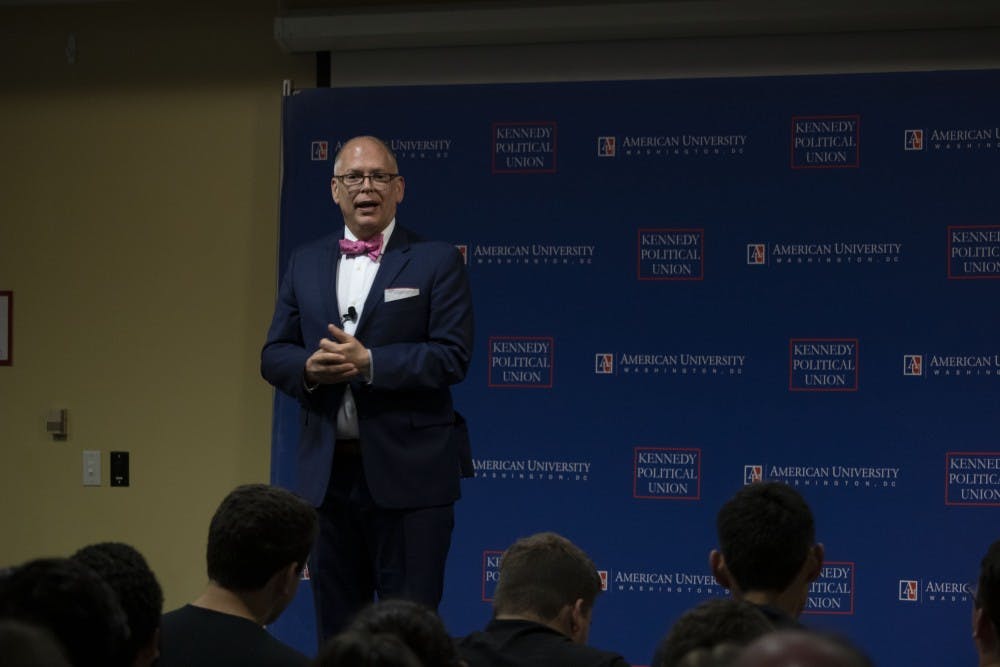At a packed Kennedy Political Union event on Tuesday, Jim Obergefell, best known for his groundbreaking Supreme Court case that resulted in the federal legalization of gay marriage, told the crowd about his experiences both leading up to and following that pivotal decision.
“People say…that decision had to be scary, it had to be a really difficult decision to make,” Obergefell said. “It absolutely was not – potentially, it was one of the easiest decisions I’ve ever had to make.”
The event was co-sponsored by KPU, American University PRIDE and Visible Magazine. Kevin Norton, the KPU director, said in an email to the Eagle that his team wanted to place special emphasis on the 50th anniversary of the Stonewall Riots and the progress made by the LGBTQ community since then.
“KPU thought about which moments stuck out as truly monumental, and I had to look no further than Mr. Obergefell and the landmark Obergefell v. Hodges,” Norton said. “It was his personal story, though, that brought many attendees to tears and reminded many in KPU the impact we can have on students is why we do this.”
Obergefell told the 310 attendees the story of the lawsuit’s origins, from his experiences growing up as a closeted gay man to his husband’s diagnosis of ALS, their decision to get married and the legal battle that ranged from Ohio to Washington, D.C. after his husband’s death.
The battle isn’t over, Obergefell warned. He believes that if the Supreme Court keeps its current makeup, the decision might stand due to precedent, but otherwise, marriage rights may once again be at risk. This isn’t the only civil rights issue, either, he said. He encouraged the audience to stand up for the rights of all minorities, including the trans community and people of color.
“I felt like I would let a lot of brave people across this country down if I didn’t…keep up the fight,” Obergefell said in an interview with student media before the event. “I’m working towards the day that every kid can grow up…without apology or without fear for being who they are.”
Obergefell said he and his partner, John Arthur, had always hoped to be legally married, but gay marriage was not recognized in their home state of Ohio.
Then, in 2013, Arthur was diagnosed with ALS, prompting the two to fly down to Baltimore, Maryland, to get married. Upon their return to Cincinnati, an attorney friend of theirs pointed out that Ohio didn’t recognize their union. When Arthur passed away, Obergefell would not be legally recognized as his spouse.
“Do you want to do something about that?” the attorney asked. The couple decided they did.
The couple then sued the state of Ohio over the right to marry. The case, which later became known as Obergefell v. Hodges, won in federal district court.
Three months after that first victory, as the case gained additional plaintiffs, John passed away.
“When he died, he knew he died a married man,” Obergefell said. “He knew that the death certificate would say he was married, and that I was his surviving spouse. I knew that gave him some comfort.”
The Court of Appeals ruled against them months later, but it only slowed the progress of the suit on its way to the Supreme Court.
Finally, the ruling was announced by the Supreme Court on June 26, 2015.
“I squeaked in my seat, jumped up and grabbed my friend’s hands, like, ‘Oh God, here it comes,’” Obergefell remembered. “[He] starts to read the decision, and my immediate reaction: we won!
“That thought was closely followed by the realization that, for the first time in my life as an out gay man, I felt like an equal American,” Obergefell told the crowd.
Obergefell gave them some advice for protecting civil rights in the current political climate.
“Don’t lose hope,” Obergefell said. “Yeah, there’s a lot of bad things going on, but things are so much better than they were just 10, 20 years ago...that perspective [isn’t] always easy to keep.”
He encouraged allies to stand up and support the LGBTQ community.
“So for our allies, it’s: support us, but let us lead, let us say what is an issue. Get on board with us, and don’t say ‘Oh, that’s really not a problem,’ because we need all the allies we can get.”
The simplest act of support?
“Vote,” Obergefell said.
dpapscun@theeagleonline.com





